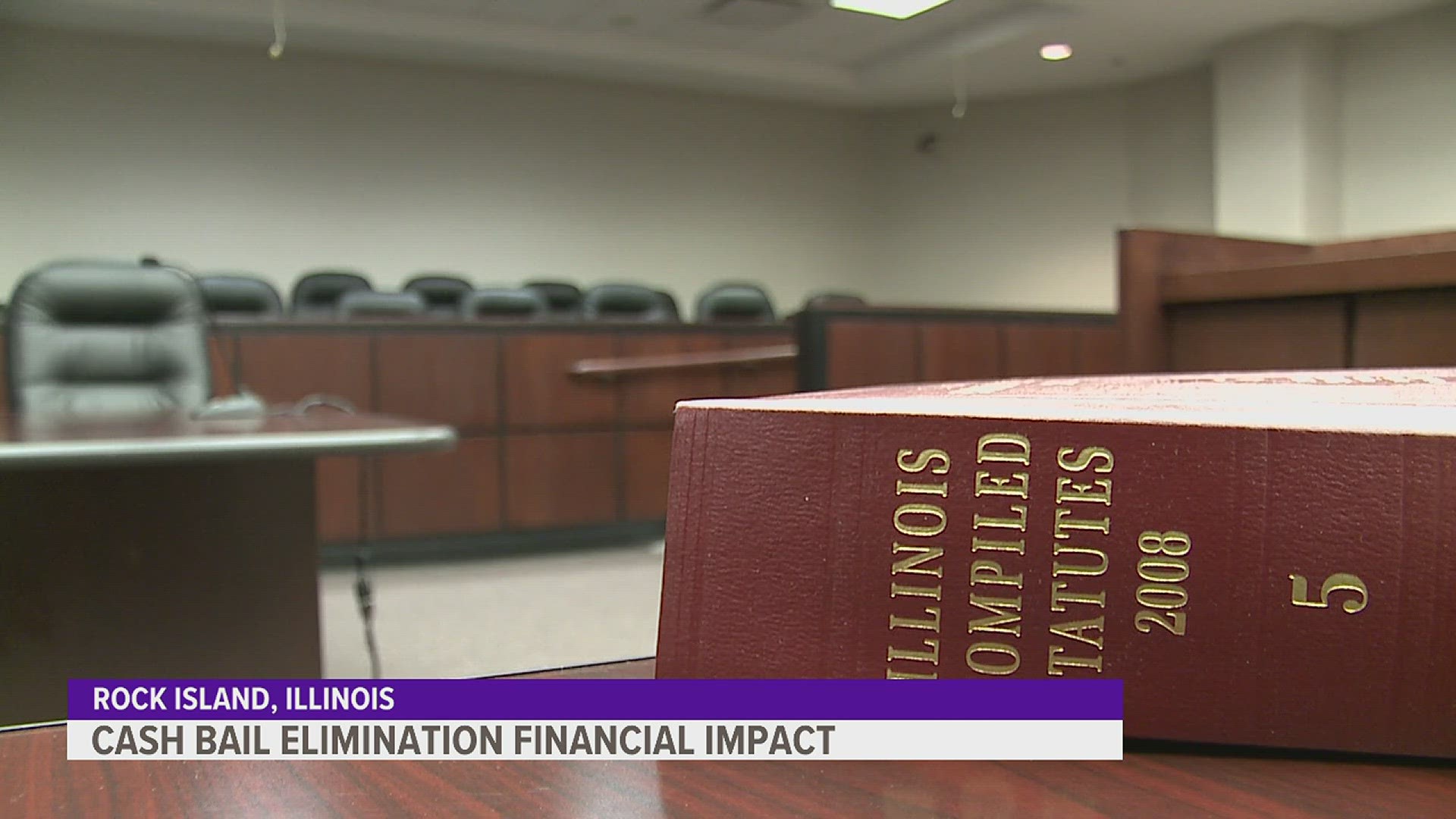ROCK ISLAND, Ill. — The elimination of cash bail in Illinois next month is bringing changes to the justice system, including from a financial standpoint.
Across Illinois' 102 counties, circuit court clerk offices collect and manage the payments of fines, fees, assessments and court costs and distribute those payments.
As it stands currently, in criminal cases a judge can set a cash bail which a person must pay in order to be released from jail while the case is pending. That payment, if made, is then held until the end of the criminal case proceedings. At that point, in the event of a conviction, the court may order a series of fines, fees and assessments to be paid, which are often paid using the upfront bond payment previously collected.
"Those are all statutory fees that we set up in our system and are created through the legislature or through the Illinois Supreme Court, so then that money goes into the appropriate line item within the accounts receivable on that person's case," said Tammy Weikert, the Rock Island County circuit clerk. "Some of the line items would be the fine amount, the judicial security, it could be the law library fee, it could be court automation, dock storage, clerk fee, etc."
After all court obligations have been met, the circuit clerk is authorized to retain 10% of the posted bond as a bond processing fee.
"It goes into the circuit clerk's line item and it takes staff to manage the automation, manage the accounting, manage that money," Weikert said. "It takes a person to do that. It takes a system to do that."
Once all fines and fees are applied from the bond payments, the remaining dollar amount is refunded back to the person who paid the bond.
Come Sept. 18 when the use of cash bail will be eliminated, many of those fines and fees will remain. It just means that an upfront bond payment won't be used to satisfy them. However, revenue generated through the circuit clerk bond processing fee will be eliminated.
The Illinois Supreme Court Pretrial Practices Implementation Task Force gathered data from the majority of the state's county courts in order to measure the financial impact this policy change will have on counties.
From 2016 to 2020, it gathered data from 96 Illinois counties. In 2021, it gathered additional data from 95 counties.
In 2016, across the 96 Illinois counties that provided data, bond payments processed and disbursed in criminal cases totaled $154.7 million. Circuit court clerks collected $15.1 million in bond processing fees.
In 2020, those amounts decreased to $121.4 million total processed and disbursed, while $4.9 million was retained as bond processing fees.
The task force determined that 2020 is not a representative year due to disruptions caused by the COVID-19 pandemic, including court closures, case delays and a reduction in crime and arrests, which likely led to a lower volume of processed cases and therefore fewer court fees and fines.
In 2021, the total bond payments processed and disbursed in 95 Illinois counties totaled $83.1 million, with $6.8 million retained as bond processing fees.
In Rock Island County specifically, in 2016 the court collected $1,673,068 in bonds. Of that, $1,528,114 was applied to fees and fines. The circuit clerk bond processing fee totaled $228,034.
In 2021 in Rock Island County, $1,414,013 in bond payments were applied to fees and fines. To break that down, 50% was applied to fees, 6.5% applied to fines, 3.6% applies to restitution and 40% was refunded. The circuit clerk bond processing fee of $133,820 is included in that 50%.
Because of the elimination of cash bail, Weikert's office will no longer get that revenue fee in its general fund. There are numerous other fees that are included in that total, for example fees on domestic battery, youth diversion, foreclosures, abandoned property, appeals, copies, NSF charges, passports, and a fee to help with automation of the office functions, the Rock Island County Treasurer told News 8.
In 2021, the total fee revenue for the circuit court clerk general fund was $1,327,639.89. The bond processing fee made up 10% of that.
"There's too many unknowns yet to determine what the financial impact is going to be for the county," Weikert said. "There have been so many historical events in the last five years that have caused different circumstances. To make a decision about going forward, you have to look backwards and you can kind of make an educated decision. But because the last few years (pandemic, case backlog) have been so strange, it's really hard to determine what's going to happen in the future."
In the meantime, she plans to monitor her office's monthly revenues and expenditures and make sure it's following the new directions laid out by the Illinois Supreme Court or any new directives from the chief judge or state's attorney.
"We've always brought in additional revenue than what our office has cost," Weikert said. "I like to make sure that the fees that we're bringing in are about equal to the cost for our staff for those salaries. And so far, it's always pretty much been equal, relatively equal. At this point, I'm just going to monitor it and make adjustments or recommendations based on how we see those fees coming in.
In 2021, eight of our hometown county circuit clerk offices; including Bureau, Carroll, Henry, Jo Daviess, Mercer, Rock Island, Warren and Whiteside counties; were able to collect more than $300,000 in those bond processing fees that will now be eliminated. Knox and Henderson counties did not disclose their financial data in the report.
To view the full county by county breakdown for 2016-2020, click here. For the additional 2021 report, click here.
Watch more news, weather and sports on News 8's YouTube channel

